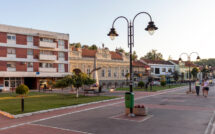

Helsinki can feel quite desolate on winter mornings. It is in January 2017 that I started conducting ethnographic fieldwork in Kontula, a district on the urban periphery of Helsinki with a notoriously negative reputation rooted in narratives of unemployment, crime, and substance abuse. However, in spite of these difficulties, on the global scale most of Kontula’s residents would qualify as middle-class. I conducted ethnographic research there for twelve months in 2017 and three months in 2018, focusing on people’s everyday life. In particular, I observed people as they sought services from charitable organizations or sat at cafés or outside on the sidewalk.
One particular morning, I noticed people standing outside an outpatient care facility that serves people facing issues of substance abuse or mental health. The facility is situated inside a large dilapidated open-air shopping center built in the late 1960s. On that morning, I saw a dozen or so people smoking cigarettes outside the facility and others steadily going in and out. The atmosphere was generally quiet and dull, although I could hear occasional arguments, which people quickly hushed. I went inside the health care facility and noticed a small group of people standing by some pool tables. A television was on, although muted, and most of the patients there were queuing at the cafeteria to buy oatmeal porridge and coffee, available to them for a nominal price.
What struck me immediately upon this first visit to the care center was the way its “patrons” or “customers”—the official term used to describe those using the center’s services—used work-related metaphors to describe their everyday non-work activities. I heard one man say that his shift was over and that he would next go for a pint—something an employee might say when leaving work. I saw others, who appeared to be regulars, borrow mobile phones from the center’s employees and saying that it was for “business” purposes. People I spoke with revealed that many “customers” were also volunteers who did housekeeping work at the facility. As I would later learn, this was a place where it was possible for the disadvantaged residents of Kontula to gain a rare sense of normalcy—a luxury for these people who are ceaselessly discriminated against by mainstream society. The ways in which they framed their everyday activities at the care facility set me to explore the notion of their agency and how they perceive their impact on society.
To better understand how the poor residents of Kontula experience their disadvantaged and marginalized positions, I first explore how Kontula developed as a district that is both a product of the Finnish model of urbanization and the representation of a specific imaginary of residential stigma. I then investigate how Kontula’s residents have developed a sense of belonging based on emotions rooted in place. I argue that the balance between formality and informality in their lives is connected to symbolic boundaries separating an inside from an outside. Finally, I draw on my research to call for a sensitive understanding of agency and citizen participation in marginalized urban contexts.
Stigma and belonging in a Finnish urban periphery
Kontula is home to almost 15,000 people and is a central location for the 40,000 residents of the Mellunkylä city district to access certain amenities, for example at the local health center, library, and various grocery stores. While outsiders often view Kontula suspiciously and stigmatize it, people who live there cherish it as a lively neighborhood and a place with a tight sense of community where life is unpretentiously informal. The negative stigma associated with Kontula emerged soon after the neighborhood was built in the 1960s and has developed based on various factors. Kontula’s first residents were mostly working class people from Helsinki’s central districts, where they were seen as transient and peripheral by the more affluent population. Kontula was designed to offer this working class comfortable and modern housing conditions. For example, apartments were spacious and had balconies, fridges, and central heating—amenities that may not have been available in Helsinki’s central districts at the time. In spite of these improvements in housing conditions, Kontula acquired a negative reputation early on (Kokkonen 2002). In the early 1990s, which was a period of large-scale economic depression, especially for the industrial working classes, the stigmatization of Kontula as a disadvantaged area was accentuated. Kontula’s open-air shopping center—in particular the many cheap bars and pubs it hosts—became a symbol of unemployment and marginalization in a country struggling in the face of major social restructuring. In the twenty-first century, residents have been further stigmatized, as new narratives of segregation, failed immigrant integration, and rapid increase in substance abuse have emerged. Although this image of Kontula is both superficial and mostly inaccurate, it has had a tremendous impact on how the area has been seen by outsiders, most of whom have probably never been there.
In Kontula, the local community is mostly bound by informal ties constituted through daily casual encounters, and residents feel a powerful sense of belonging and shared cultural intimacy based on their experience of living together in a stigmatized urban periphery. In anthropological theory, cultural intimacy provides a way for people to challenge mainstream society from a marginalized position and to turn their “imperfections” into sources of pride (Herzfeld 2016). In Kontula, disadvantaged residents take pride in their capacity to survive in their sometimes chaotic surroundings. They often casually joke about their difficult life situation and their peripheral position in society as something familiar and normal to them. Moreover, the difficulties they face in their everyday ordinary activities help them develop a sense of agency.
Questioning agency
I spoke to people who frequented the care facility or visited bars in the Kontula shopping center. During these conversations, my informants often said that the district of Kontula was the only place where they felt like taking an active part in something. They felt that their daily lives may well be ordinary but allowed them to feel a powerful sense of belonging. For example, unlike elsewhere in Finland or Helsinki specifically, in Kontula many of the recent immigrants I interviewed reported feeling comfortable and welcome. They also revealed that they felt that everyday interactions were effortless, a feeling shared by individuals from other disadvantaged groups. For example, Terhi, who worked in one of the community centers in the area, reflected on her unique relationship with the Kontula community:
I know this sounds like a cliché, but I have not encountered a similar sense of community anywhere in Helsinki. If one of the regulars has not been seen for a while, people go check that he or she is OK. If someone is facing hard times, he or she finds consolation. These places [community centers] offer so much support. It came to me as a surprise. Our job is to give formal advice on how to deal with social services, but as awful as it feels to say this, these people have become experts on many of the issues concerning hardship situations, because they have had to endure them for such a long time.
The notion of agency has been debated in sociology. In particular, the role of change and resistance in agency has been discussed: “our theoretical impulse is often to think of agency in terms of escaping the ordinary rather than as a descent into it” (Das 2007, 6–7). This framework is useful in interpreting my ethnographic findings. For people in challenging life situations characterized by poverty, substance abuse, mental health problems, or systemic racism, agency mostly means that they are able to achieve a sense of normality even if they cannot resist oppressing structures. However, normality is rarely discussed in debates over agency. In Kontula, my informants occasionally brought up their aims to change society (one definition of agency), but these goals mostly remained elusive, as they required a sense of control unavailable to people who are forced to exert so much energy to achieve a simple sense of normality.
Insiders’ and outsiders’ agency
Residents of Kontula have accepted its negative reputation and the stigmatization associated with it. As a result, they have come to realize that they live in a “periphery”—a “problem area” with rigid boundaries. The neighborhood is separated from surrounding areas in which middle-class values are the norms. I found that people in Kontula do feel a sense of pride and belonging, but they also feel subordinate to the power of the central districts of Helsinki. What Kontula’s residents see as effortless sociality and a welcoming atmosphere is often conceived of as marginalization by the authorities, which puts the residents of Kontula at risk for segregation. Consequently, I found that residents continuously adjust to this external view. Indeed, locals have become experts in both navigating local lifeworlds and understanding the expectations of the dominant class about how they should behave. Tarja, a 30-year-old woman with a long history of substance abuse and an energetic figure in a volunteers’ organization, summarized her situation:
After dealing with so many authorities in my life, always on the subordinate side, I have become very good at understanding their ways of thinking. For some, you just have to agree on everything and play the role of the victim. With others, you have to insist on your rights and really try to influence their decisions. The whole thing is exhausting; it feels like you are playing this awful game all the time. Many of them are not human beings—they have absolutely no idea what my life is like.
Tarja’s experience reveals the inordinate amount of work people must do in their relationship with officials. They must always be aware of power relations and what is expected of them; they must constantly balance pride and shame in their encounters with officials who have power over them. However, Kontula also offers people such as Tarja opportunities to develop a positive and proud identity.
Balancing pride and shame in Kontula
The residents of Kontula I interviewed reported that the hierarchies they faced sometimes flatten and that the boundaries between the inside and the outside of Kontula become blurred. In these fleeting moments, their sense of belonging extends beyond their own community of Kontula. One occasion for this extended sense of belonging has been the annual Kontula Electronic Festival, which features electronic music, performance art, film, and food. For some of my informants, the springtime festival has been a rare opportunity to see people from the outside in the open-air shopping center. A local group of volunteers called Lämmin Itä (Warm East) has had a significant role in the festival, as it has been responsible for the catering and for organizing several cultural events. Most of these volunteers, also residents of Kontula, have had a history of substance abuse and mental health problems, and many have also been active in other NGO-coordinated activities. In 2017, while I was in Kontula doing fieldwork, at the end of a long and successful festival, the group gathered to discuss their experience:
So many visitors said that they were surprised to find food that was both vegan and delicious, cooked by regular people here;
The whole place felt different, much like the city center, but we were still in charge;
This was something really big, I would not have believed that all these people could find their way here.
Tarja, who has been active in the group from its beginning and has had a central position in planning, cooking, and serving food to the artists, staff, and guests, reflected on her experience relating to outsiders during the festival in a moving way:
This might be difficult to understand for many of you, but for me, the biggest thing was the ease of talking with people, many of whom were visiting Kontula for the first time. I have my own group of friends, but we feel like outcasts whenever we are with other people. Then I try to interact with the authorities, but they rarely treat me with respect—I ask them for something, and they question whether I am allowed to have it. Over the course of the weekend, all the encounters have been on equal ground—I serve people food; they thank me for that and ask for my advice about the festival and about Kontula. It has been years since I last felt like this.
This statement illustrates that festival organizers came to feel a sense of purpose during the event. The festival temporarily erases the boundary between an inside and an outside and allows people to become agents through ordinary acts. However, this is a rare occurrence, as encounters between Kontula’s insiders and the outside remain usually tense and result in Kontula’s residents being forced into compromises.
Pekka Tuominen is a social and cultural anthropologist specializing in urban transformation, the sociocultural qualities of space, and the moral dimensions of urbanity. He is currently Senior Research Fellow at the University of Helsinki for the Co-Creation Radar research consortium. His current research concentrates on urban transformation, segregation, and citizen participation in Helsinki. He has been one of the organizers of Kontula Electronic since 2017. He has published on the topic of Kontula in Social Inclusion, Frontiers in Sustainable Cities, and Space and Culture
References
Das, Veena. 2007. Life and Words: Violence and the Descent into the Ordinary. Berkeley: University of California Press.
Herzfeld, Michael. 2016. Cultural Intimacy: Social Poetics and the Real Life of States, Societies and Institutions. Third Edition. London ; New York: Routledge.
Kokkonen, Jouko. 2002. Kontula: Elämää lähiössä. Helsinki: Suomalaisen Kirjallisuuden Seura.
Published on June 17, 2024.




